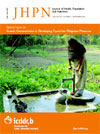
|
The Journal of Health, Population and Nutrition
icddr,b
ISSN: 1606-0997
EISSN: 1606-0997
Vol. 23, No. 4, 2005, pp. 377-387
|
 Bioline Code: hn05050
Bioline Code: hn05050
Full paper language: English
Document type: Research Article
Document available free of charge
|
|
|
The Journal of Health, Population and Nutrition, Vol. 23, No. 4, 2005, pp. 377-387
| en |
Effectiveness of Depot-holders Introduced in Urban Areas: Evidence from a Pilot in Bangladesh
Gazi, Rukhsana; Mercer, Alec; Khatun, Jahanara & Islam, Ziaul
Abstract
Depot-holders are women from the community who promote good health practice and use of clinics. They keep a stock of contraceptives and oral rehydration salts to supply other women and are paid some incentives. In 2003, the NGO Service Delivery Program (NSDP) introduced depot-holders in three types of urban area in Bangladesh as a pilot. This evaluation study was carried out to: (a) establish a baseline for measuring the impact of activities of depot-holders on a comprehensive range of indicators in the long-term, (b) make a preliminary assessment of the impact on the use of selected services of the essenial services package (ESP) and other indicators at the end of the pilot phase, and (c) assess the cost of introducing depot-holders and running their activities for a year. Data from the baseline and end of pilot household surveys, together with service statistics from the intervention and comparison areas, were used for assessing the changes in clinic use and commodity distribution. The study found evidence that the depot-holders transferred knowledge to women in the community, provided services, and referred women to clinics run by non-governmental organizations (NGOs). There was a large increase in the number of client contacts at the NGO clinics and in the quantity of oral contraceptive pills and oral rehydration salts distributed by the NGOs, mostly attributable to the activities of the depot-holders. The estimated cost per depot-holder per year was Tk 15,241 (US$ 262). Overall, the performance of the depot-holders in the pilot phase suggests that they can be introduced in different types of urban area and can be effective in their dual role as providers and promoters of services.
Keywords
Health services; Cost analysis; Depot-holders; Community-based distribution; Family planning; Essential services package; Evaluation studies; Urban; NGOs; Bangladesh
|
| |
© Copyright 2005 - ICDDR,B: Centre for Health and Population Research
Alternative site location: http://www.jhpn.net
|
|
